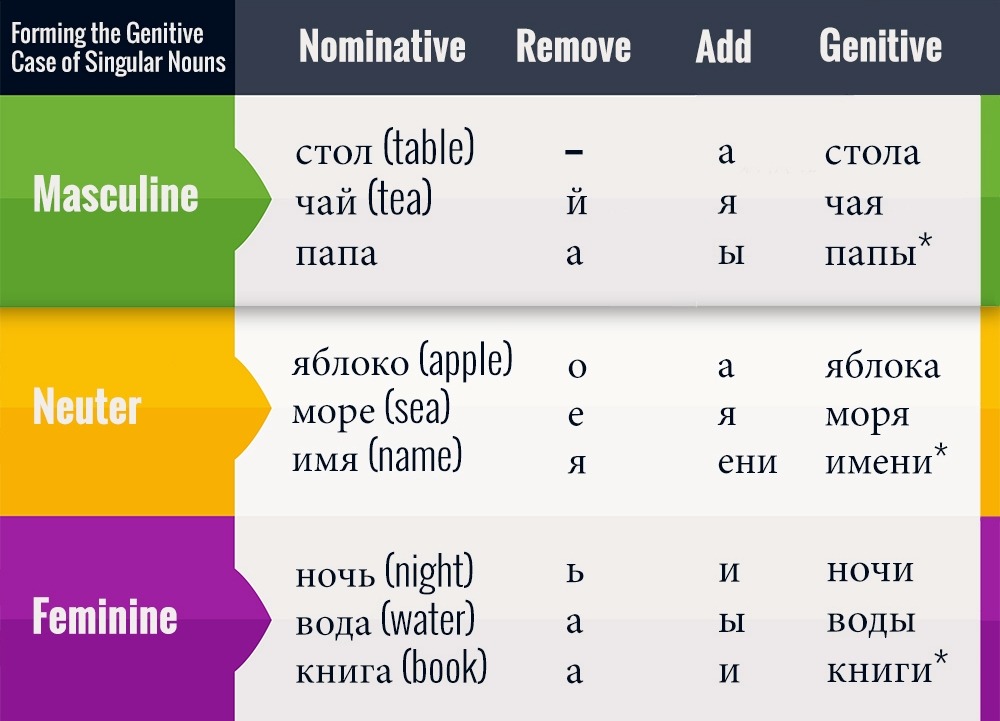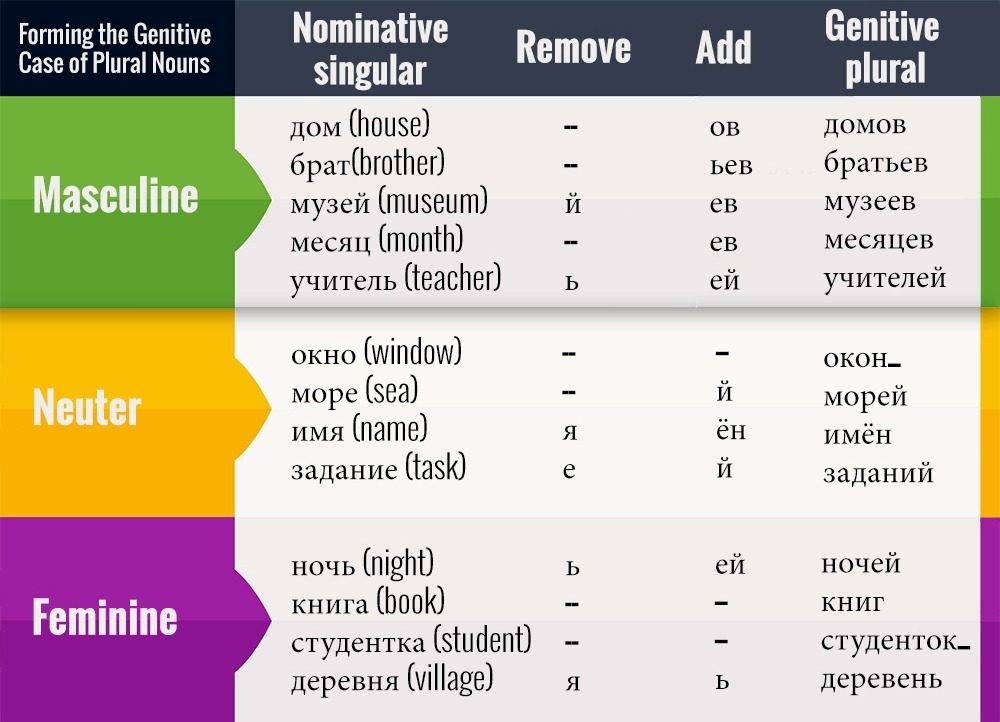Conquering the Genitive Case in Russian
The Russian language is notorious for its six cases, which, along with the endings, arguably make up the biggest challenge for learners. Do not be daunted, though. If you take it one case at a time, you will see that they’re not that hard to master.
Let’s concentrate on the basic uses of the genitive case in Russian for now.
When to Use the Genitive Case in Russian
To begin with, let’s concentrate on when to use this case.
To Show Possession
Это машина отца. – This is my father’s car.
The word “отца” (“father’s”) is in the genitive case. As you can see, the word order is different in Russian than it is in English, and the word in the genitive case always follows the word in the nominative case (the object):
Это книга моего брата. – This is my brother’s book.
Принеси телефон Анны. – Bring Anna’s phone.
Note that to express possession in Russian, the English equivalent of which would be “(someone) has (something)”, the following structure with the genitive case is used: У + noun/pronoun in the genitive case + есть + noun/pronoun in the nominative case (subject)
У отца есть машина. – My father has a car.
У брата есть книга. – My brother has a book.
У Анны есть телефон. – Anna has a phone.
In Negations (after the word “нет”)
У отца нет машины. – My father hasn’t got a car
У брата нет книги. – My brother doesn’t have a book.
У Анны нет телефона. – Anna hasn’t got a phone.
Note that in such sentences both nouns are used in the genitive case: “отца” and “машины”, “брата” and “книги”, “Анны” and “телефона”.
У нас нет сахара. – We don’t have any sugar

When We Speak of Part of the Whole
стакан молока – a glass of milk
крыша дома – the roof of the house
немного воды – some water
After Certain Verbs
Verbs such as хотеть (want), требовать (demand, request), бояться (be afraid of) and просить (ask) use the genitive case:
Я хочу воды. – I want some water.
Мы не боимся темноты. – We are not afraid of the dark.
Просить разрешения. – ask permission.
After Numerals
Два (two), три (three), четыре (four) and their compounds like двадцать два (twenty-two) we use words in the genitive case in singular:
Два дома – two houses
Двадцать две книги – twenty-two books
Четыте кота – four cats
For Пять (five) and higher, as well as after the words много (a lot/much/many), мало (little/few), сколько (how much/many), несколько (a few) we use words in the genitive case in plural:
Пять домов – five houses
Мало книг – few books
Сколько котов – how many cats?
Forms of Words in the Genitive Case
The endings of nouns in the genitive case are not as confusing as they seem to be at a first glance. The tables below should make it easier for you to memorize the endings:
Forming the Genitive Case of Singular Nouns

The ending “а” is added to the masculine ending in a hard consonant and neuter nouns ending in “-o” respectively.
The ending “-я” is added to masculine nouns ending in” -й”, “-ь” and neuter nouns ending in “-е” and “-ие”.
Feminine nouns ending in “-я”, “-ь” take genitive singular ending “-и”.
Feminine nouns ending in “-a” take genitive singular ending “-ы”.
Please note that there are some exceptions due to the spelling rules:
Add the ending “-и” instead of “-ы” in feminine nouns ending in hard “-к”, “-г”, “-х” or “–ж”, “-ш”.
Add the ending “-а” instead of “-я” in masculine nouns ending in “-ч” and “-щ”.
The word “папа” (dad) is masculine but it has the same genitive form as a feminine noun because it ends in “а”. Also, the genitive form of the noun “имя” (name) is “имени”.
Forming the Genitive Case of Plural Nouns
The majority of the masculine nouns ending in a consonant take the genitive plural ending “-ов”.
The words “брат” and “лист” take the genitive plural ending “-ьев”
A masculine noun ending in “-й” takes the genitive plural ending “-ев” if the ending is stressed.
A masculine noun ending in “-ц” takes the genitive plural ending “-ев” if the ending is unstressed.
If a masculine noun ends in “-ж”,”-ч”,”-ш”,”-щ”,”-ь” , it takes the genitive plural ending “-ей”.
Please note that there are some exceptions, such as:
друзья (friends) –друзей
деньги (money, always plural in Russian) – денег
год (year) – лет
раз (time) – раз
человек (person) – человек
Some Things to Remember
Neuter nouns ending in “-о” remove “о”, and sometimes a vowel is inserted between the two consonants as in “окно” – “окон”, “письмо” – “писем”.
Neuter nouns ending in “-е” take the ending “-ей”.
Neuter nouns ending in “-я” take the ending “-ён”.
Neuter nouns ending in “-ие” take the ending “-ий”.
Feminine nouns ending in “-я” replace “я” by “ь”
Feminine nouns ending in “-а” remove the “a”, and sometimes a vowel is inserted between two consonants: “студентка” – “студенток”, “песня” – “песен”.
There are some exceptions, when a noun takes both the ending “ь” and a vowel is inserted between the consonants, i.e.:
Деревня (village) – деревень
Кухня (kitchen)-кухонь
Learn Russian Faster Using LingQ
These days, learning a new language is easier than ever…thanks to the internet.
Immersing yourself in Russian doesn’t require you to travel abroad or sign up for an expensive language program.
However, it can be a bit tiresome to find interesting content, go back and forth between sites, use different dictionaries to look up words, and so on.
That’s why there’s LingQ, the best way to learn Russian from content you love!
You can import videos, podcasts, and much more and turn them into interactive lessons.
Keep all your favorite Russian content stored in one place, easily look up new words, save vocabulary, and review. Check out our guide to importing content into LingQ for more information.
LingQ is available for desktop as well as Android and iOS. Gain access to thousands of hours of audio and transcripts and begin your journey to fluency today.
***
Ievgeniia Logvinenko is passionate about languages and holds a Master’s degree in English philology. In addition to English, she speaks Russian, Ukrainian, Polish, German and basic French.

